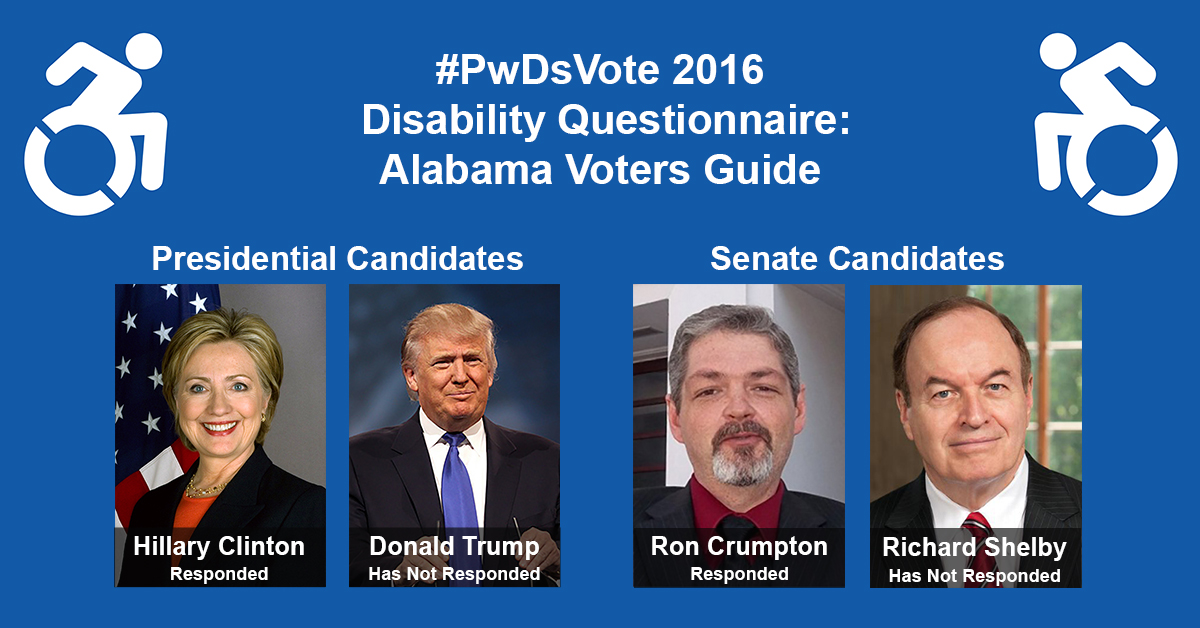Washington, Oct. 18 – As voters get ready to head to the polls in Alabama, RespectAbility has released its Alabama Disability Voter Guide for the upcoming senate and presidential races. Democrat Ron Crumpton, who is challenging incumbent Republican Sen. Richard Shelby, as well as presidential candidate Hillary Clinton, has completed the #PwDsVote Disability Campaign Questionnaire for people with disabilities. Shelby has not yet responded to the questionnaire.
The #PwDsVote 2016 Campaign Questionnaires were designed by and for people with disabilities (PwDs) and those who love them to know where candidates stand on key issues. RespectAbility is nonpartisan and does not endorse candidates. The questionnaires are purely for educational purposes as voters go to the polls.
According to a new report from Rutgers University, 35.4 million people with disabilities will be eligible to vote in the November 2016 elections, representing close to one-sixth of the total electorate. That’s an increase of nearly 11 percent since 2008.
The presidential questionnaire was created during the primary season and asked all of the presidential candidates to comment on 16 disability questions. Former Secretary of State Hillary Clinton responded by addressing all of the questions. Despite numerous requests in person and by phone and email, the Trump campaign has not yet filled out the questionnaire. The American Association of People with Disabilities and the National Council on Independent Living also has a nonpartisan presidential questionnaire, which both Clinton and Trump have completed. Libertarian Gary Johnson and Green Party candidate Jill Stein have not filled out either questionnaire.
The down-ballot survey was adapted from the presidential questionnaire to ask gubernatorial candidates 16 questions and senatorial candidates 17 questions. All answers are posted verbatim and in full on The RespectAbility Report, a publication that covers the intersection of disability and politics.
Twenty-six candidates for Senate, as well as eleven candidates for governor, from both sides of the aisle (22 Democrats, 14 Republicans, 1 Green Party) completed the down ballot questionnaire, showing that disability rights is a nonpartisan issue. An additional nine candidates responded that they are not completing any questionnaires during this campaign season. The responses also are geographically-diverse, coming from states all around the country, as politicians are paying more and more attention to the disability community.
Alabama’s 776,448 citizens with disabilities now have a chance to read Crumpton’s responses and understand where he lies on certain issues. RespectAbility is still awaiting responses from Shelby and will publish them verbatim if and when they are received.
Alabama ranks second to last in the nation for employment of people with disabilities as only 27.2 percent of the working-age people with disabilities in Alabama have a job. Alabama has a lot of work to do if they wish to improve outcomes for people with disabilities. The upcoming elections and the implementation of the Workforce Innovation and Opportunity Act (WIOA) will continue to increase opportunities and employment for people with disabilities, and voters need to know where candidates stand on the issues.
While Crumpton did not answer each question individually, he sent a letter addressing several of the issues brought up in the questionnaire including education, employment, healthcare and caregivers. He also talked about how his own disability and that of his nephew influence his views.
“I myself suffer from disabilities due to spinal stenosis and cervical spine disease and have a nephew, who lives with me, that has Cerebral Palsy, so I understand the issues facing those with disabilities,” he said. “The rights of our community are just as important as rights of any other, and I will be proud to champion those rights in the United States Senate.”
Fully one-out-of-five voters have a disability, and 52 percent of likely voters have a loved one with a disability. Only 34 percent of working-age Americans with disabilities have jobs, despite the fact that the vast majority want to work. More than 11 million working age people with disabilities are now living on government benefits in our country.
RespectAbility President Jennifer Laszlo Mizrahi said, “It is vital for us to know where the candidates stand on the disability aspects of economic, stigma, education, safety, transportation, housing, healthcare, foreign affairs, criminal justice and other issues. Candidates have hugely different ideas about how to deal with the issues. Thus, it’s extremely important to read their full answers so you can understand their vast differences. We also are disappointed that Mr. Trump and Sen. Shelby have yet to complete the RespectAbility questionnaire and hope they will do so soon. We will send out any updates that arrive.”
Alabama Needs to Improve Outcomes for Citizens with Disabilities
There are 422,549 Alabamians with disabilities who are between the ages of 18-64. Additionally, there are over 21,200 Alabamians ages 16-20 with disabilities. More than 72,000 Alabama students have individual education plans (IEPs). However, some Alabama children with disabilities may not yet have received a disability diagnosis they need, and thus are not yet receiving the school accommodations and supports that they need to succeed. This can lead to a lifetime of poverty or flowing down the school to prison pipeline.
Alabama is second to last among states when it comes to the employment of people with disabilities. There are over 422,000 people with disabilities between the ages of 18 to 64 in Alabama and only 27.2 percent of them are employed. Additionally, there is still a 44.1-point gap when you consider the 71.3 percent of people without disabilities in Alabama who are working. Additionally, each year a quarter of the youth ages 16-20 in Alabama will age out of school and face more challenges and potentially end up in the school-to-prison pipeline.
RespectAbility, founded in 2013, is a nonpartisan, nonprofit organization working to end stigmas and advance opportunities for people with disabilities. It has submitted comments for all 50 state’s drafts of the Unified Plan as required under Section 102 of WIOA. Alabama’s commitment to people with disabilities is evident throughout the written state plan. The plan mentions commitments to youth with disabilities and programs to aid them, such as peer mentoring and internships. There are programs listed such as the Summer Work Program, Smart Work Ethics Training, Jointly-Funded Job Coach, and Alabama State Interagency Transition Team, which will increase collaboration with other organizations and actors, which is necessary to improve outcomes.
One of the most important facets of WIOA is that it raises expectations for youth with disabilities and assists states to provide them with the supports they need to ensure success. Indeed, as Alabama’s Baby Boomers retire and the state’s economy evolves, employers are starting to experience increasing talent shortage. Alabamians with disabilities are an untapped resource that can be trained to bridge that gap. Indeed, a recent detailed study by the Kessler Foundation and the University of New Hampshire shows the 70 percent of working age people with disabilities are striving for work.
Evidence shows that people with disabilities can provide a wonderful solution to companies and other employers that want to succeed. The diverse skills, greater loyalty and higher retention rates of people with disabilities are already starting to meet employer talent needs in increasing numbers around America. With WIOA, Alabama can benefit from that progress if it truly breaks down silos within government agencies and partners, and lets innovation, based on evidence-based practices, take place.
However, the gap in the labor force participation between people with and without disabilities is still too large around the entire country. This lack of employment for people with disabilities creates poverty, powerlessness, and poor health. Polls and studies show that people with disabilities want the opportunity to have the dignity and independence that jobs provide.
America has 1.2 million youth with disabilities, between the ages of 16 and 20. Each year 300,000 of them age into what should be the workforce, but stigmas and lack of knowledge about the capabilities of people with disabilities means that most do not find employers willing to hire them. Young adults with disabilities in all of these states are hoping to find work. They have high expectations and deserve the opportunity to achieve the American dream. Young people with disabilities may simply need some thoughtful help to transition into the workforce. See data on all 50 states here: State Data.
Remember to Vote
Alabama residents can vote for the candidates of their choice either on the standard voting schedule or through absentee ballots. Alabamians have until Oct. 24, 2016, to register to vote for the presidential general election. Register to vote online at: Register to Vote. More information regarding voting can be found at: Alabama Votes. If you are unable to partake in standard voting, any registered Alabama voter can apply to submit their vote through the mail with absentee ballots if they meet certain requirements. The absentee ballot applications must be turned in no later than Nov. 3. An absentee ballot returned by mail must be postmarked no later than Nov. 7 and received by the Absentee Election Manager no later than noon on Election Day. If hand-delivered, the ballot must be in the office of the Absentee Election Manager by the close of business (no later than 5:00 p.m.) on Nov. 7. More information regarding absentee ballots can be found at: Absentee Voting Information.







Be First to Comment